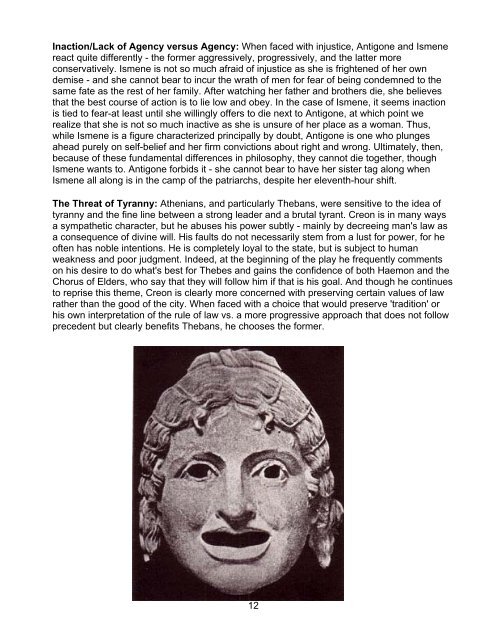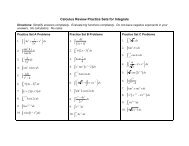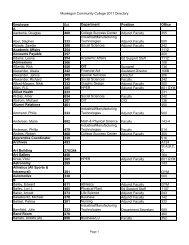Basic Information .3 - Muskegon Community College
Basic Information .3 - Muskegon Community College
Basic Information .3 - Muskegon Community College
Create successful ePaper yourself
Turn your PDF publications into a flip-book with our unique Google optimized e-Paper software.
Inaction/Lack of Agency versus Agency: When faced with injustice, Antigone and Ismene<br />
react quite differently - the former aggressively, progressively, and the latter more<br />
conservatively. Ismene is not so much afraid of injustice as she is frightened of her own<br />
demise - and she cannot bear to incur the wrath of men for fear of being condemned to the<br />
same fate as the rest of her family. After watching her father and brothers die, she believes<br />
that the best course of action is to lie low and obey. In the case of Ismene, it seems inaction<br />
is tied to fear-at least until she willingly offers to die next to Antigone, at which point we<br />
realize that she is not so much inactive as she is unsure of her place as a woman. Thus,<br />
while Ismene is a figure characterized principally by doubt, Antigone is one who plunges<br />
ahead purely on self-belief and her firm convictions about right and wrong. Ultimately, then,<br />
because of these fundamental differences in philosophy, they cannot die together, though<br />
Ismene wants to. Antigone forbids it - she cannot bear to have her sister tag along when<br />
Ismene all along is in the camp of the patriarchs, despite her eleventh-hour shift.<br />
The Threat of Tyranny: Athenians, and particularly Thebans, were sensitive to the idea of<br />
tyranny and the fine line between a strong leader and a brutal tyrant. Creon is in many ways<br />
a sympathetic character, but he abuses his power subtly - mainly by decreeing man's law as<br />
a consequence of divine will. His faults do not necessarily stem from a lust for power, for he<br />
often has noble intentions. He is completely loyal to the state, but is subject to human<br />
weakness and poor judgment. Indeed, at the beginning of the play he frequently comments<br />
on his desire to do what's best for Thebes and gains the confidence of both Haemon and the<br />
Chorus of Elders, who say that they will follow him if that is his goal. And though he continues<br />
to reprise this theme, Creon is clearly more concerned with preserving certain values of law<br />
rather than the good of the city. When faced with a choice that would preserve 'tradition' or<br />
his own interpretation of the rule of law vs. a more progressive approach that does not follow<br />
precedent but clearly benefits Thebans, he chooses the former.<br />
12
















